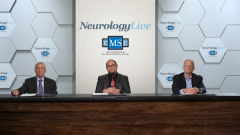
Evolution and Prevalence of Multiple Sclerosis
Ahmed Obeidat, MD, PhD; and Randall Schapiro, MD, FAAN, discuss the prevalence of multiple sclerosis and highlight how the disease has evolved since they began practicing. They also review the impact it has on patients and their support communities.
Episodes in this series

Ahmed Obeidat, MD, PhD: Hello, and welcome to this NeurologyLive® “Cognition & Brain Health in Multiple Sclerosis.” I am Dr Ahmed Obeidat from Medical College of Wisconsin, Milwaukee, Wisconsin. Joining me today in this discussion are 2 of my colleagues, Dr Randy Schapiro who is a retired clinical professor of neurology from the University of Minnesota. Dr Schapiro is also the founder of the Schapiro Center for Multiple Sclerosis in Golden Valley, Minnesota. Also, joining me today is Dr Jeffrey Wilken who is a partner at the Neuropsychology Associates of Fairfax in Fairfax, Virginia. He is an assistant professor of neurology at Georgetown University Medical Center and the director of the Washington Neuropsychology Research Group. Our conversation today will focus on a discussion on cognition and brain health in multiple sclerosis. Welcome everyone. We'll get started. Dr Schapiro and Dr Wilken thanks for being with us today. I'll start with Dr Schapiro first.
Randall Schapiro, MD, FAAN: I'm ready.
Ahmed Obeidat, MD, PhD: Dr Schapiro, will you give our audience kind of an idea on the prevalence of multiple sclerosis and how it changed over the years and kind of a brief overview?
Randall Schapiro, MD, FAAN: Ahmed, thank you for that question. It's an interesting question because it's changed dramatically just in the past few years with new data, for most of my career. Up until about 4 or 5 years ago, we said 400,000 people in the United States had multiple sclerosis [MS]. That absolutely made no sense because MS is a disease you don't die from, you die with it. We're continually adding people at the bottom and not subtracting people at the top. In other words, people are living longer, and because we keep on adding to it, it made no sense that the numbers stayed 400,000. The National Multiple Sclerosis Society commissioned many scientists to study it. What is the actual prevalence of multiple sclerosis today? And it's over a million Americans with multiple sclerosis compared with 400,000 over the years, which was a dramatic change in our thought process.
Ahmed Obeidat, MD, PhD: This is speaking on the impact of multiple sclerosis on people and talking about this impact, not only on the people who are living with MS, but also on people who are their loved ones, their families, their friends, even their community. Thus, there's a huge impact of MS on the community in the United States and beyond.
Randall Schapiro, MD, FAAN: Absolutely. I'm fond of saying that when we teach about multiple sclerosis to people, we talk about a disease of myelin, the insulation of the nerves. We talk about a disease that they oligo cell, the cell that makes myelin, we talk about disease of the immune system. We talk about the disease that has some genetic component to it, but most importantly, it's a disease of people. It's a disease of people with the psychological issues that they all come with, and it affects every aspect of life. Even if you're mildly affected with multiple sclerosis, the idea that you have a neurologic disease controls your whole lifestyle. Thus, it's really a very important human disease.
Ahmed Obeidat, MD, PhD: And to this point also the impact of multiple sclerosis on brain health, but also, on cognition kind of comes up. And this is something we're going to talk about today and focus on our discussion.
Transcript Edited for Clarity
Newsletter
Keep your finger on the pulse of neurology—subscribe to NeurologyLive for expert interviews, new data, and breakthrough treatment updates.













